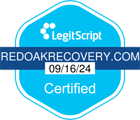A substance abuse disorder occurs when an individual develops alcohol or drug dependency that harms their life. Often, this individual can’t or doesn’t want to stop using, despite the negative consequences of their substance abuse. Initially, it can be hard to know what to do to help your loved one when they won’t acknowledge the problem or are refusing your help. You might feel as if you’re overstepping boundaries, or you see a problem that isn’t there. The individual dynamics within a family and deeper issues like codependency can affect each interaction with an addict. This makes substance abuse treatment more complicated.
At Red Oak Recovery®, we’re committed to helping young men who suffer from an addiction to drugs or alcohol. To learn about our treatment programs, please get in touch with our treatment center today at 866.457.7590.
Does Someone You Love Need Help With Substance Abuse?
It’s difficult to see someone you care about suffering. Their addiction is likely causing you to suffer as well. Broken promises, hurt feelings, the inability to share responsibilities, and emotionally reciprocate can drive large wedges between families. There may even be moments that cause you to want to give up. The people whose struggle is the most disruptive to those around them are often the ones who are in the direst need of outside help. This is true even when it appears like they won’t accept your help.
People struggling with substance abuse are more likely to take serious risks with their life and the lives of others. Therefore, getting treatment as quickly as possible can be the key to saving lives. If you notice symptoms of addiction in a loved one, regularly encourage them to seek out substance abuse treatment. When you speak to your loved one from a place of empathy and compassion, they are less likely to feel attacked. Consequently, they’re more likely to consider your suggestions.
Helping Your Loved One Through Substance Abuse
The first way to help someone you love with their disorder is to kindly and compassionately help them recognize the issue themselves. Their substance abuse has likely caused them to behave in many ways outside of their character. They may not be aware of some of their actions. This lack of awareness may be due to blackout or the cognitive deficits that they experience due to a history of chronic, severe substance abuse.
It is helpful for you as their loved one to know the symptoms of a substance abuse disorder to clear what you’re seeking to address. Many of the symptoms may be internal, but there are plenty of visible signs, such as:
- Appearing intoxicated more frequently than usual
- Experiencing lapses in memory or new issues with cognition
- Having a tired or sick appearance
- Lethargy or general malaise
- Sleeping more, sleeping less, or sleeping at odd hours
- New or worsening issues at work or school
- Changes in social functioning, such as socializing only if drugs or alcohol are involved, skipping events to stay home and get intoxicated, or using before an event to feel comfortable being around people
- Hiding their substance use and becoming defensive when confronted
Helping your loved one find the substance abuse treatment they need requires patience and persistence. Don’t be persuaded by others to give up. They may not understand what your family is going through. When you’re regularly making your concerns known, your loved one will most likely decide to make necessary changes on their own time.
Address Codependent Relationships
It’s vital to acknowledge your place in the relationship and address any codependent tendencies. Patience, empathy, and persistence are necessary, but enabling is not. Be open to listen and lend your emotional support, but don’t make excuses for behavior or try to hide what is going on. If you continue to shield your loved one from any negative consequences, this causes them to believe there isn’t a problem.
It will be challenging, but the most helpful thing you can do is not waver in your commitment to the truth of what is happening. You know their addiction is out of control, so don’t waste valuable energy trying to make your loved one appear normal or seem “okay” to others. When you’re around them, always try to set an example by not engaging in unhealthy behaviors yourself. You can carry yourself with respect by not covering up for their behavior and setting healthy boundaries.
Find Substance Abuse Treatment at Red Oak Recovery®
If you’ve gotten this far and are still interested in how you can help your loved one, you’re on the right track. Guiding them toward suitable substance abuse treatment is the best thing you can do right now. Regularly give them access to the information they need to contact a treatment center. You can also offer to take care of these arrangements yourself whenever they’re ready. Make your concerns known as often as possible before the addiction escalates or breaks the bonds of the relationship.
Red Oak Recovery® is here to take your questions about treatment plans and available options for your loved one. Being informed can make each encounter with them more productive and help lead them toward treatment. Please call Red Oak Recovery® today at 866.457.7590 to get information on helping your loved one take the first step towards recovery enrollment.









